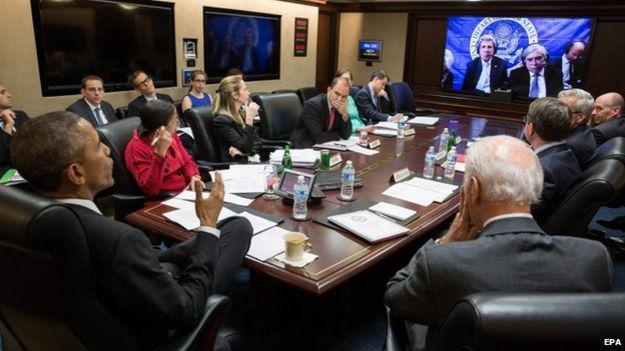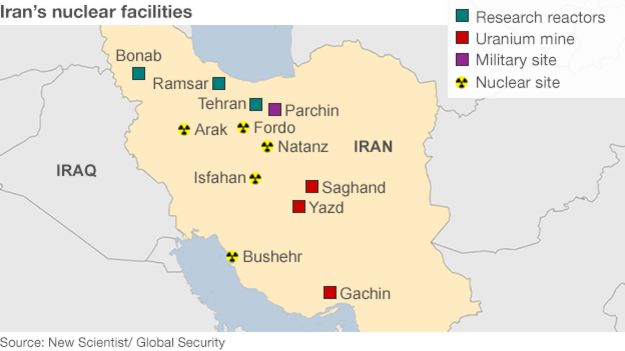Iran nuclear talks: Russia and Iran claim progress


Negotiators worked late into the night after a midnight deadline was extended
Russia's foreign minister said "all key aspects" had been agreed, but western officials said there were still outstanding disagreements.Negotiations between six world powers and Iran will resume on Wednesday, overrunning a deadline for a deal.
World powers want to restrict Iran's nuclear programme in return for sanctions relief.
Earlier, the US state department said that "enough progress" had been made to merit working through a midnight deadline but that "several difficult issues" remained.
'Agreement in principle'
It is still unclear whether the most contentious issues have been resolved.
But Russian Foreign Minister Sergei Lavrov was quoted as saying that "one can say with relative certainty that we at the minister level have reached an agreement in principle on all key aspects of the final settlement of this issue".
"It will be put down in writing over the next few hours, maybe during the day," he told Russia's Tass news agency.
Iranian Foreign Minister Mohammad Javad Zarif said that "quite a bit" had been accomplished.
Some officials have said they are optimistic about securing a deal on Wednesday

Iranian Foreign Minister Mohammad Javad Zarif said he hoped an agreement could be finalised on Wednesday

"I hope that we can finalise the work on Wednesday," he said.
The so-called P5+1 — the US, UK, France, China and Russia plus Germany — are seeking to ensure Iran could not assemble a nuclear weapon in less than a year.
The Iranians insist that they have no such ambition.
Under pressure
Negotiations at Lausanne's Beau-Rivage Palace hotel continued into the early hours of Wednesday morning after a self-imposed deadline on a provisional agreement was extended.
French Foreign Minister Laurent Fabius followed his Chinese counterpart in leaving Lausanne, but said he would return as soon as it was "useful".
Meanwhile, US President Barack Obama held a video conference overnight with the US negotiating team. He was briefed on the progress of the talks by Secretary of State John Kerry but no details were released.
President Obama was briefed about the talks late on Tuesday

The BBC's Barbara Plett Usher, who is at the talks, says that walking away from the talks would be difficult for the US.
The team is under pressure to return with something they can use to argue their case in front of a sceptical Congress, our correspondent says.
Sticking points
After months of negotiations, the basic outline of an agreement is well known.
Iran would scale its nuclear programme and subject it to rigorous inspection for at least 10 years. In exchange, there would be an easing and eventual end of crippling UN, US and EU sanctions.
However, there are some issues yet to be resolved. These are thought to include:
- Length of restrictions — Iran's nuclear activities would be strictly limited for at least 10 years. After that, Iran wants all limits to be lifted. The P5+1 says they should be removed progressively over the following five years
- Sanctions relief — Iran wants the UN sanctions suspended soon after an agreement. The P5+1 says they should be eased in a phased manner, with restrictions on imports of nuclear-related technology remaining for years
- Non-compliance — The US and its European allies want a mechanism that would allow suspended UN sanctions to be put back into effect rapidly if Iran reneges on a deal. Russia reportedly accepts this, but wants to ensure its Security Council veto rights are protected


Iran's desire to be able to develop advanced centrifuges is another point of contention.
The centrifuges could enrich uranium faster and in greater quantities. Enriched uranium is used as fuel for nuclear reactors, it can also be used to make nuclear bombs.
Adding to the list of issues to be resolved, Iran's lead negotiator has ruled out sending its existing stockpile of nuclear fuel abroad, a step demanded by world powers.
Any agreement would set the stage for further talks aimed at achieving a comprehensive accord by 30 June.
Israel's Prime Minister Benjamin Netanyahu has reiterated his opposition to the proposed deal, saying that the framework agreement would allow Iran to develop a nuclear weapon quickly.
"In our estimate, it will be reduced to perhaps a year, most likely much less than that."
Source: Korupciya.world
Политика конфиденциальности | Правила пользования сайтом







